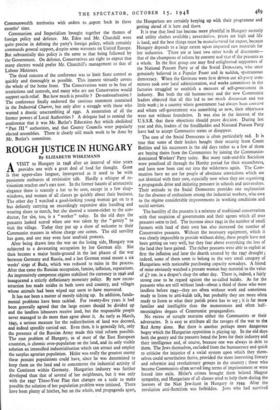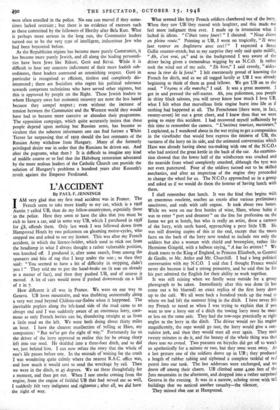ROUGH JUSTICE IN HUNGARY
By ELIZABETH WISKEMANN
AVISIT to Hungary in 1948 after an interval of nine years provides one with a great deal of food for thought. Gone is that upper-class languor, interspersed as it used to be with passionate outbursts of revisionist talk. Hardly a whisper of re- visionism reaches one's ears now. In the former haunts of aristocratic elegance there is scarcely a hat to be seen, except in a few shop- windows, and women of all classes go quickly about their business. The other day I watched a good-looking young woman get on to a bus defiantly carrying an exceedingly expensive skin handbag and wearing shoes to match, but she showed a season-ticket to the con- ductor, for she, too, is a " worker " today. In the old days the peasants looked scared when one was taken by the " gentry " to visit the village. Today they put up a show of welcome to their Communist masters in whose charge one comes. The old servility has gone, and one may even hear unafraid protests.
After being drawn into the war on the losing side, Hungary was subjected to a devastating occupation by her German ally. She then became a major battle-ground in the last phases of the war between Germany and Russia, and a last German stand meant a six weeks' siege of Buda, which was reduced to 'ruins in the process. After that came the Russian occupation, famine, inflation, reparations. An impressively competent regime stabilised the currency in 1946 and inaugurated a strictly deflationary monetary policy. By now recon- struction has made strides in both town and country, and villages whose animals had been wiped out seem to have recovered.
It has not been a matter of merely tidying up. In addition, funda- mental problems have been tackled. For twenty-five years it had been generally agreed that the large estates should be divided up and the landless labourers receive land, but the responsible people never managed to do more than agree about it. As early as March, 1945, a serious measure for the redistribution of land was decreed, and indeed speedily carried out. Even then, it is generally felt, only the presence of the Russian Army made this vital reform possible. The root problem of Hungary, as of most of the East European countries, is chronic over-population on the land, and its only visible solution an intensified industrialisation which can attract and employ the surplus agrarian population. Hitler was really the greatest enemy these peasant populations could have, since he was determined to keep them on the land and to concentrate the industrial activity of the Continent within Germany. Hungarian industry was further developed than that of several of her neighbours, but it was only with the 1947 Three-Year Plan that changes on a scale to make possible the solution of her population problem were initiated. There have been plenty of hitches, but on the whole, and propaganda apart,
the Hungarians are certainly keeping up with their programme and getting ahead of it here and there.
It is true that food has become more plentiful in Hungary recently and utility clothes available ; nevertheless, prices are high and life is hard, and the best things must be manufacrured for export, because Hungary depends to a large extent upon imported raw materials for her industries. There are at least two other kinds of discontent— that of the champions of reform by consent and that of the peasants as a whole. In the first group one may find enlightened supporters of the National Peasant Party or of the Social Democrats, who once genuinely believed in a Popular Front and in sudden, spontaneous democracy. When the Germans were first driven out all-patty com- mittees took over local administration, and works committees in the factories struggled to establish a measure of self-government in industry. But both the old bureaucracy and the new Communist leaders objected that all this led to too much discussion and too little work ; in a country where government had always been coercive and where self-government was something so new, their objections were not without foundation. It was also in the interest of the U.S.S.R. that these objections should prove decisive. During last year and this, leaders of the Smallholder and National Peasant Party have had to accept Communist terms or disappear.
The case of the Social Democrats is often particularly sad. It is true that some of their leaders bought their security from Count Bethlen and his successors in the old days rather as a few of them are buying theirs from the Communists by joining the Communist- dominated Workers' Party today. But many rank-and-file Socialists were penalised all through the Horthy period for their staunchness, and have now been cast out into the wilderness again. The Com- munists have no use for people of obstinate convictions which are not identical with their own, especially now when they arc organising a propaganda drive and initiating pressure in schools and universities. Their attitude to the Social Democrats provides one explanation for the absence of enthusiasm among the industrial workers, who owe to the regime considerable improvements in working conditions and social services.
The hostility of the peasants is a mixture of traditional conservatism with that suspicion of governments and their agents which all true peasants seem to feel. The increase since 1945 in the number of small farmers with land of their own has also increased the number of Conservative peasants. Without the necessary equipment, which it was clearly impossible to provide without delay, these people have not been getting on very well, but they fear above everything the loss of the land they have gained. The richer peasants were able to exploit at first the inflation and later the dearth created by the 1947 drought ; indeed, some of them seem to belong to the very small category of Hungarians with noticeable purchasing capacity nowadays. A friend of mine enviously watched a peasant woman buy material to the value of £7 los. in a draper's shop the other day. There is, indeed, a fairly strong case to be 2rgued against the so-called kulaks. As for the peasants who are still without land—about a third of those who were landless before 1945—they are often without work and sometimes ready to listen to anti-knlak talk, but probably they are more often ready to listen to what their parish priest has to say ; it is far more familiar and intelligible than the monotonous and often half- meaningless slogans of Communist propagandists.
No excess of scruple restrains either the Communists or their adversaries. It is easy to attribute all the ravages of the war to the Red Army alone. But there is another perhaps more dangerous bogey which the Hungarian opposition is playing up. In the old days both the gentry and the peasants hated the Jews for their industry and their intelligence and, of course, because one was always in debt to them. The Jews themselves, excluded from the bureaucracy and quick to criticise the injustice of a social system upon which they them- selves could nevertheless thrive, provided the more interesting literary and reformist and revolutionary groups in the country ; those who became Communists often served long terms of imprisonment or were
forced into exile. Hitler's crimes brought them belated Magyar sympathy, and Hungarians of all classes tried to help them during the horrors of the Nazi Jew-hunt in Hungary in 1944. After the revolution anti-Semitism was forbidden. Jews who had survived
were often enrolled in the police. No one can marvel if they some- times lacked restraint ; but there is no evidence of excesses such as those committed by the followers of Horthy after Bela Kun. What is perhaps more serious in the long run, the Communist leaders turned out to be the very type of intelligent, industrious Jew who had been boycotted before.
As the Republician regime has become more purely Communist, it has become more purely Jewish, and all along the leading personali- ties have been Jews like Rakosi, Gero and Revai. While it is difficult to hear any concrete indictment of their more foolish sub- ordinates, these leaders command an astonishing respect. Genii in particular is recognised as efficient, tireless and completely dis- interested ; there are Socialists who regret his political tolerance towards competent technicians who have served other regimes, but this is approved by people on the Right. These Jewish leaders to whom Hungary owes her economic recovery are none the less hated because they compel respect ; even without the increase of tension between the Communist and the Western world they would have had to become more coercive or abandon their programme. The opposition campaign, which quite accurately insists that these people depend upon nothing but Russian arms, has become so virulent that the soberest informants one can find foresee a White Terror far surpassing that of 1919 should the last remnants of the Russian Army withdraw from Hungary. Many of the formerly privileged desire war in order that the Russians be driven out. And after the pogroms, what then ? It is difficult to imagine any kind of middle course or to feel that the Habsburg restoration advocated by the more zealous leaders of the Catholic Church can provide the solution of Hungary's problems a hundred years after Kossuth's revolt against the Emperor Ferdinand.



































 Previous page
Previous page